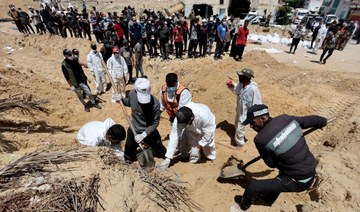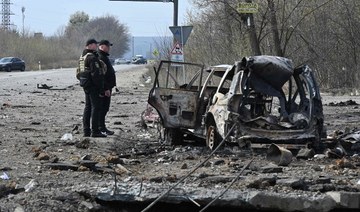UNITED NATIONS: After a resounding defeat in the UN Security Council, the United States is poised to call for the United Nations to reimpose sanctions on Iran under a rarely used diplomatic maneuver — a move that is likely to further isolate the Trump administration and may set off a credibility crisis for the United Nations.
The sanctions had been eased under the 2015 nuclear deal that President Donald Trump withdrew from two years ago. But last week the US lost its long-shot bid to indefinitely extend an international arms embargo on Iran and has now moved to a new diplomatic line of attack.
US Secretary of State Mike Pompeo is set to travel to New York on Thursday to notify the Security Council president that the United States is invoking the “snapback” mechanism in the council’s resolution that endorsed the nuclear deal. It allows participants to demand the restoration of all UN sanctions in a complicated procedure that cannot be blocked by a veto.
The State Department is expected to announce Pompeo’s travel plans on Wednesday, but he and Trump have made no secret of their intention to invoke snapback, especially since their attempt to extend the arms embargo suffered an embarrassing defeat last Friday. The US won just one other “yes” vote, with China and Russia opposed and the 11 other members abstaining.
Just like the arms embargo extension, the administration’s snapback plan is bitterly opposed by China and Russia as well as the other Security Council members, including US allies Britain and France, and could set the stage for a battle over the legitimacy of the UN’s most powerful body.
Alone among the council’s 15 members, the US argues that as an original participant in the nuclear deal it retains the right to demand restoration of sanctions. The others, which still support the deal, maintain the US lost that standing when Trump pulled out of the accord in 2018, but it isn’t clear if they can stop the invocation of snapback through technical procedural means.
The US argument is highly controversial. It has been ridiculed by the Chinese, Russians and Europeans, and not even the biggest Iran hawks in the United States all agree with it.
Former Trump national security adviser John Bolton, no slouch when it comes to anti-Iran positions, has long said that the US lost its snapback standing when it withdrew from the deal and that moving ahead is not worth the damage it could do to US veto power in the council.
In a stunningly rare moment of agreement, Iran’s Foreign Minister Mohammed Javad Zarif praised Bolton this week. “At least he is consistent — a trait notably absent in this US administration,” Zarif tweeted.
And, former US Undersecretary of State for Political Affairs Wendy Sherman, a top Obama administration negotiator of the nuclear agreement, said: “It was never expected that someone who withdrew from the (deal) would have standing to in fact bring the snapback provision.”
Thus, the administration’s insistence on moving ahead has set the stage for a contentious dispute and the possibility that the US call would simply be ignored by other UN members. That outcome would potentially call into question the Security Council’s ability to enforce its own legally binding decisions.
Under the terms of Security Council Resolution 2231, which enshrined the nuclear deal and to which the US remains a party, the invocation of snapback for significant Iranian noncompliance starts a 30-day clock during which the council must vote affirmatively to continue the sanctions relief that Iran was given in return for curbs on its nuclear program.
Pompeo is expected to present evidence of significant noncompliance, likely the latest reports of the UN nuclear watchdog, the International Atomic Energy Agency, on Thursday. Iran does not deny violating some terms of the deal but says its actions have been forced by the US withdrawal and the Trump administration’s reimposition of US sanctions.
As envisioned by the Obama administration, which led the negotiations that culminated in the nuclear deal, the United States or any other permanent member of the council could use its veto to block the continuation of sanctions relief. In theory, that would result in the reimposition of sanctions.
But whether any other council member will respond to the US move by introducing a resolution to extend sanctions relief is an open question. Some UN experts believe the others will just ignore the Americans, leaving the Trump administration in the possible position of having to introduce its own resolution to extend sanctions relief for the sole purpose of vetoing it.
“We don’t know if any country will do that,” said Richard Gowan, the UN director of the International Crisis Group. “If the general view of the council is that the US doesn’t have standing, it’s quite possible that no council member will even engage at that level.”
“The US could actually table a resolution of its own and then veto it, just to show that it is going through the procedural motions, although that would look a little bit farcical,” Gowan said.
UN crisis looms as US readies demand for Iran sanctions
https://arab.news/4rvks
UN crisis looms as US readies demand for Iran sanctions

- Pompeo is set to notify the Security Council president that the US is invoking the “snapback” mechanism
- Just like the arms embargo extension, the administration’s snapback plan is bitterly opposed by China and Russia
Moroccan man guilty of murdering man in UK in revenge for Gaza

- Ahmed Alid killed his 70-year-old victim after approaching him from behind
- After his arrest, he told detectives he had committed the acts because of the conflict in Gaza, and in revenge for Israel killing innocent children
LONDON: A Moroccan man who stabbed to death a passer-by in the street in northeast England in what he later told police was revenge for Israeli action in Gaza was found guilty of murder on Thursday.
Ahmed Alid, 45, who had sought asylum in Britain, killed his 70-year-old victim after approaching him from behind on a road in Hartlepool the early hours of Oct. 15 last year, having previously attacked his housemate with two knives, prosecutors said.
After his arrest, he told detectives he had committed the acts because of the conflict in Gaza, and in revenge for Israel killing innocent children, blaming Britain for creating Israel, Britain’s Crown Prosecution Service (CPS) said.
Alid said if he had had a machine gun, and more weapons, he would have killed more people.
“By his own admission, Ahmed Alid would have killed more people on that day if he had been able to,” Nick Price, Head of the CPS Special Crime and Counter Terrorism Division, said in a statement.
“Whatever his views were on the conflict in Gaza, this was a man who chose to attack two innocent people with a knife, and the consequences were devastating.”
Alid had first used two knives to attack his sleeping housemate, to whom he had become aggressive after learning of his conversion to Christianity, stabbing him six times while shouting “Allahu Akbar,” or “god is greatest,” the CPS said.
The 32-year-old housemate, one of five asylum seekers who shared the property, managed to fight him off and another occupant came to his aid. Alid left the house with one of the knives and walked toward the center of Hartlepool.
He passed Terence Carney on the opposite side of the road before circling back and attacking him from behind, stabbing him six times in the chest, abdomen and back. Carney died shortly after police arrived.
Following his interview with police, he attacked the two female detectives, with one suffering injuries to her shoulder and wrist.
He was found guilty at Teeside Crown Court of murder, attempted murder and two counts of assaulting an emergency worker. He will be sentenced on May 17, when the judge will decide if his actions were related to terrorism.
India dismisses US human rights report as ‘deeply biased’
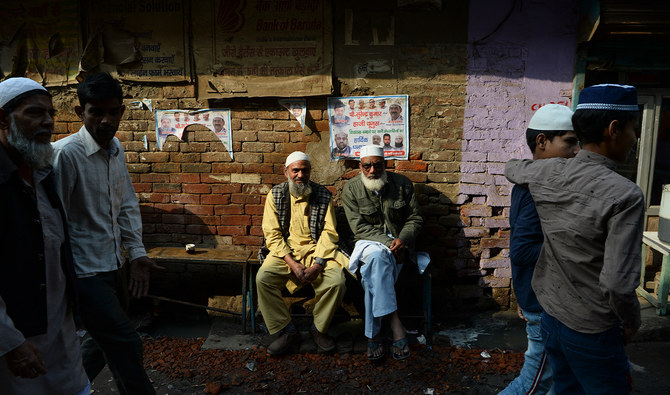
- Report found “significant” abuses in India’s Manipur state and attacks on minorities, dissenters
- India’s foreign ministry spokesperson says New Delhi does not attach any “value” to the report
NEW DELHI: New Delhi said on Thursday it does not attach any value to a US State Department report critical of human rights in India, and called it deeply biased.
The annual human rights assessment released earlier this week found “significant” abuses in India’s northeastern Manipur state last year and attacks on minorities, journalists and dissenting voices in the rest of the country.
Asked about it, Indian foreign ministry spokesperson Randhir Jasiwal told journalists on Thursday that the report “as per our understanding, is deeply biased and reflects a very poor understanding of India.”
“We attach no value to it and urge you to also do the same,” Jaiswal said.
Responding to a question about the growing protests on US university campuses against Israel’s offensive in Gaza that has killed more than 33,000 people, Jaiswal said that “there has to be the right balance between freedom of expression, sense of responsibility and public safety and order.”
He added that “democracies in particular should display this understanding in regard to other fellow democracies, after all we are all judged by what we do at home and not what we say abroad.”
While India and the US have a tight partnership, and Washington wants New Delhi to be a strategic counterweight to China, the relationship has encountered some minor bumps recently.
In March New Delhi dismissed US concerns over the implementation of a contentious Indian citizenship law, calling them “misplaced” and “unwarranted,” and objected to a US State Department official’s remarks over the arrest of a key opposition leader.
Last year Washington accused Indian agents of being involved in a failed assassination plot against a Sikh separatist leader in the US, and warned New Delhi about it.
India has said it has launched an investigation into Washington’s accusations but there has not been any update about the investigation’s status or findings.
Sweden to send NATO troops to Latvia next year: PM
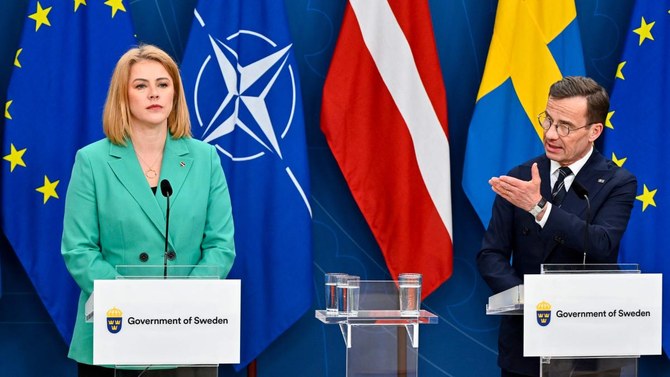
- The Swedish troop contribution was the first to be announced since the Scandinavian country joined NATO in March
- The battalion would be comprised of around 400 to 500 troops
STOCKHOLM: Sweden will next year contribute a reduced battalion to NATO forces in Latvia to help support the Baltic state following Russia’s invasion of Ukraine, Prime Minister Ulf Kristersson said Thursday.
The Swedish troop contribution was the first to be announced since the Scandinavian country joined NATO in March.
Kristersson had in January announced that Sweden would likely send a battalion to take part in NATO’s permanent multinational mission in Latvia, dubbed the Enhanced Forward Presence, aimed at boosting defense capacity in the region.
“The government this morning gave Sweden’s armed forces the formal task of planning and preparing for the Swedish contribution of a reduced mechanized battalion to NATO’s forward land forces in Latvia,” Kristersson told reporters during a press conference with his Latvian counterpart Evika Silina.
He said the battalion, which will be in Latvia for six months, would be comprised of around 400 to 500 troops.
“Our aim is a force contribution, including CV 90s armored vehicles and Leopard 2 main battle tanks.”
“We’re planning for the deployment early next year after a parliament decision,” he said.
UK police make fourth arrest after migrant deaths off France

- NCA said it arrested an 18-year-old from Sudan late Wednesday on suspicion of facilitating illegal immigration and entering the UK illegally
- The latest arrest took place at Manston in Kent, southeast England, and the suspect was taken into custody for questioning
LONDON: UK police said Thursday that they had arrested another man after five migrants, including a child, died this week trying to cross the Channel from France.
The National Crime Agency (NCA) said it arrested an 18-year-old from Sudan late Wednesday on suspicion of facilitating illegal immigration and entering the UK illegally.
The arrest came as part of an investigation into the Channel small boat crossing which resulted in the deaths of five people on a French beach on Tuesday.
The NCA detained two Sudanese nationals aged 19 and 22, and a South Sudan national, also 22, on Tuesday and Wednesday, also on suspicion of facilitating illegal immigration and entering the UK illegally.
The 19-year-old has been released without charge, and is now being dealt with by immigration authorities, said the NCA.
The latest arrest took place at Manston in Kent, southeast England, and the suspect was taken into custody for questioning.
Three men, a woman and a seven-year-old girl lost their lives in the early hours of Tuesday in the sea near the northern French town of Wimereux.
They had been in a packed boat that set off before dawn but whose engine stopped a few hundred meters from the beach.
Several people then fell into the water. About 50 people were rescued and brought ashore but emergency services were unable to resuscitate the five.
Fifteen people have died this year trying to cross the busy shipping lane from northern France to southern England, according to an AFP tally.
That is already more than the 12 who died in the whole of last year.
Belgium summons Israeli ambassador over aid worker’s death
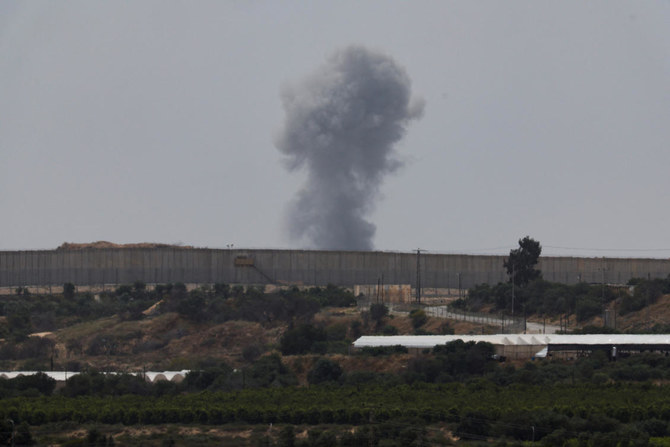
- Abdallah Nabhan, 33, along with his seven-year-old son, 65-year-old father, 35-year-old brother and six-year-old niece, were killed in Israel strike
- The airstrike hit the family home where 25 people were sheltering
BRUSSELS: Belgium said Thursday that it would summon Israel’s ambassador to explain the death in a Gaza airstrike of an aid worker with its Enabel development agency, as well as members of his family.
“Bombing civilian areas and populations is contrary to international law. I will summon the Israeli ambassador to condemn this unacceptable act and demand an explanation,” Foreign Minister Hadja Lahbib said on X.
Enabel said in a statement that Abdallah Nabhan, 33, along with his seven-year-old son, 65-year-old father, 35-year-old brother and six-year-old niece, were killed “after an Israeli airstrike in the eastern part of the city of Rafah.”
An Enabel employee & his family have been killed in Gaza. We express our solidarity with his family & colleagues.
— Hadja Lahbib (@hadjalahbib) April 25, 2024
Bombing civilian areas & populations is contrary to international law. I will summon the Israeli ambassador to condemn this unacceptable act & demand an explanation.
The airstrike hit the family home where 25 people were sheltering, including people displaced by the Israeli military operation in Gaza, Enabel said.
It said that Nabhan, who had worked on a Belgian development project helping young people find jobs, and his family were on a list Israel had of people eligible to exit Gaza, but that they were killed before being granted permission to leave.
Enabel’s chief, Jean Van Wetter, called their deaths “yet another flagrant violation by Israel of international humanitarian law.”
The health ministry in Gaza, run by the Hamas militant group, says more than 34,000 people have died in the war being waged in the Palestinian territory, most of them women and children.
Israel is conducting airstrikes and ground operations there in retaliation for a Hamas attack on October 7 that killed around 1,170 people in Israel, according to an AFP tally of Israeli figures.
Belgium, which currently holds the EU presidency, is among the European countries most vocal in condemning Israel’s operation as disproportionately deadly for Palestinian civilians.





